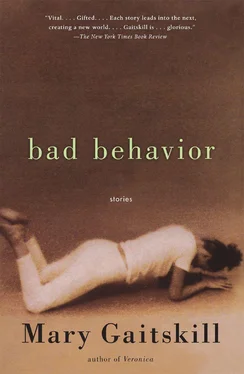He descended into the dank grayness of the subway, relishing slightly her surprise appearance. He had never gone to work this way before. It was probably the route she always took.
He wondered what kind of job she had; she had been wearing blue jeans stuffed into short, scuffed black boots and a tweed coat with a purple scarf folded around her neck. He wondered if it had embarrassed her to encounter him in a suit, obviously the holder of the better job. In college they had often discussed how one should deal with the world in order to become successful. He saw her ghost lying on its side on his rumpled sheets, resting on one elbow, her then-long hair lying randomly on her shoulders, telling him what she thought about success. He smiled a little. The subway banged harshly into view, and he pressed forward with the sleepy, odorous mass he joined each morning.
He emerged in a cleaner area of Manhattan and entered the spinning glass doors of a gray building that was as grainy and oblong as a cartoon drawing of an office building in The New Yorker . He worked for an independent film distribution company that dealt mainly in foreign films. It was a prestigious place to work, and he was proud of himself for getting the job right after graduation. When he first started there, it had thrilled him to know that he could attend screenings of important films, take his friends to see them free, and meet famous people every now and then.
The office was small and contained mixed knotty-legged furniture and the square orange desks of secretaries and assistants. There was a bulletin board tacked with magazine headings and photographs slabbed together. “Hi, Joel,” said the receptionist. She was echoed by two other assistants as he walked by. He stopped to chat with Cecilia, a colleague with whom he had had an affair during his first two years at the company. Now that it was over, they were friends and often had lunch. She talked to him about her date the night before.
“I’m intrigued,” she said. “He’s done work for”—she named two fashionable directors—“and next summer, he’s going to France to work with Eric Rohmer. He’s very good-looking. And funny and intelligent. Everything.”
“Sounds perfect. Where did Mr. Wonderful take you?”
“The Gloucester House. That seafood place around Fiftieth?”
“And then what?”
She returned his playful leer and told him.
He didn’t feel belittled by Cecilia’s wealthier, more prestigious boyfriends, partly, he supposed, because he felt that he had somehow joined their ranks sheerly by virtue of his affair with her. He did feel slightly humiliated by Cecilia’s speedy rise in the company, however, which had left him behind in the same job he’d been doing for three years. “My inner time clock isn’t the same as everyone else’s.” It occurred to him that he’d said that a long time ago to the phantom girl he’d seen on the street.
He sat at his desk, looked through yesterday’s mail and then, bracing himself, he got on the phone. He spent a great deal of time calling student film groups and guilds across the country, trying to interest them in Ariel films. He had always been very good at it, but now he had to fend off the idea that it might be depressing. One of the women he currently went out to dinner with also did most of her work on the phone. She had once said to him, in her nervously irritated way, that doing most of her business by phone had begun to seem strange to her. “Think about it,” she said, gripping her noodle-bearing fork in tight, elegant fingers. “All day long you’re in that room by yourself, talking to disembodied voices. Hundreds of ’em during the year. You’re immersed in floating utterances. You don’t know these people, you don’t even know what they look like. There’s no handshake, nothing. Just a pattern of sounds coming out of a plastic thing with holes.”
“You’re exaggerating,” he said. “For comic effect.”
“Barely. I never should’ve taken this job. I’ve always hated talking on the phone.”
Why was he always attracted to these small, dramatic women?
He got on the phone and began selling Ariel’s latest release — an American film he disliked and didn’t want to distribute. The plot was ridiculous; he was surprised when it was met with such a friendly critical response. It concerned a young Chinese woman working in a Japanese geisha bar in San Francisco, who is trying to find a relative she has never seen, an uncle who disappeared shortly after a murder that took place during a meeting of an obscure, crackpot Chinese political group. The woman never finds her uncle, although someone keeps leaving photos of him in her path, along with impossible excerpts from the I Ching . It was idiotic, but popular with college students. “It’s not a political film per se, although there is a political element present. It’s more about communal identity and illusion,” he said to buyers.
After lunch there was a meeting about several new films under consideration. One of them was based on a novella by a famous South American writer about a child forced into prostitution by her grandmother. Listening to the discussion of the film reminded him again of the girl he had passed on the street that morning. The subject of child prostitution almost always did, even after all this time. This was because she had told him, almost on meeting him, that she had left home at the age of fifteen and had, when she was sixteen, become a hooker for two months. She was a twenty-two-year-old college junior when they met, but the information had formed a fascinating gauze that floated over her for the entire time that he knew her.
He went to a screening of the South American film after work. It was a beautifully photographed political allegory, the kind he nearly always liked. But the frame that stayed with him had nothing to do with politics. The dark child, raped by her brutal first customer, turns her head to avoid his kiss, and a flat, brilliant fish swimming in imaginary water is superimposed, with rippling subtlety, over her face, a memory, perhaps, of the pretty fish tank in her grandmother’s demolished mansion.
When he got home he called one of the women he dated. “Nothing special,” he said. “Just checking up on you. Seeing how you are.”
She was pleased by his call, and told him she’d been depressed all week because of an agent’s reaction to her writing. He lost interest in the conversation sooner than he’d expected. He told her he had to go, but that he’d call her soon. Then he called the woman who hated telephones. She was depressed too. Her father had been calling to talk to her about how awful his life was, sometimes before she made it out of the apartment in the morning. That was a little more entertaining, but he cut that short too.
He made himself a quick dinner of packaged vegetable-flavored Indian noodles with butter. Then he opened a can of sardines and took them into his bedroom to eat in front of the TV. The best thing that he found to watch was a talk show featuring a beautiful teenaged movie star who had recently performed an erotic nude scene in a box office hit. He liked to watch her. Her precise, careful manner would have seemed stiff in a grown woman, but was charming in a child sex star. Half-formed illusions about meeting and seducing her absorbed him as he ate his noodles.
He went to bed early. When he woke up, he realized that he’d been dreaming. A fourteen-year-old girl had been given to him to take care of by some vague authority. She was a lovely tall child with wide solemn eyes and long dark hair. She hated clothes and walked around the apartment naked. He was not just excited by this, he was exhilarated and moved by her innocence. He remembered an image of her bicycling down the block in unconcerned leggy nakedness, her hair catching the sunlight. The dream then took an unfortunate turn. She was chased by a host of anxious neighbors, all trying to drape her with garments. They caught her and wrested her from his care with accusations of indecency and child molestation.
Читать дальше












